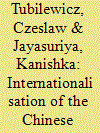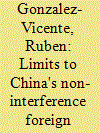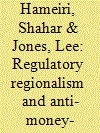|
|
|
Sort Order |
|
|
|
Items / Page
|
|
|
|
|
|
|
| Srl | Item |
| 1 |
ID:
136950


|
|
|
|
|
| Summary/Abstract |
The special issue this article opens engages with an apparent conundrum that has often puzzled observers of East Asian politics—why, despite the region's considerable economic integration, multilateral economic governance institutions remain largely underdeveloped. The authors argue that this ‘regionalism problématique’ has led to the neglect of prior and more important questions pertaining to how patterns of economic governance, beyond the national scale, are emerging in East Asia and why. In this special issue, the contributors shift analytic focus onto social and political struggles over the scale and instruments of economic governance in East Asia. The contributions identify and explain the emergence of a wide variety of regional modes of economic governance often neglected by the scholarship or erroneously viewed as stepping stones towards ‘deeper’ multilateralism.
|
|
|
|
|
|
|
|
|
|
|
|
|
|
|
|
| 2 |
ID:
136954


|
|
|
|
|
| Summary/Abstract |
This article examines the participation of China's Yunnan Province in the Greater Mekong Subregion (GMS) in order to understand the dynamics behind the regionalisation and internationalisation strategies adopted by a Chinese subnational state. It argues that the Yunnan case demonstrates the outflow of state capital—both national and provincially based—to have been instrumental in harnessing Beijing's and Kunming's political support for programs of subregional economic cooperation. This political support has led to a state capital alliance underpinning the economic expansion of provincial state capital into the GMS. It also argues that subregional governance arrangements, such as those featuring in the GMS, embed the competitive advantage of state capital through new forms of extra-territorial governance that ostensibly de-emphasises the political dimensions of state capital. The internationalisation of Yunnan subnational state is reflected in its political strategy of subregional governance. These changes point to complex rescaling of not just national state but also subnational states in Asia that find expression in variegated regional and subregional political projects.
|
|
|
|
|
|
|
|
|
|
|
|
|
|
|
|
| 3 |
ID:
136955


|
|
|
|
|
| Summary/Abstract |
China's foreign policy has been long committed to a principle of non-interference in the internal affairs of sovereign countries. While one could easily point out past and present-day inconsistencies in its implementation, this article argues that defenders and critics of the principle both rely on a limited interpretation of ‘interference’ or ‘intervention’ based on an ideology of Westphalian sovereignty. Particularly problematic is the conceptual distinction between the ‘political’ or ‘diplomatic’, on the one hand, and the ‘economic’, on the other. As Polanyi's concept of embeddedness reminds us, markets, society and politics occur simultaneously, and can only act as discrete realms in epistemological abstractions. It is thus argued that non-interference is a semi-formal institution that governs China's diplomatic engagements and affects its economic activities. While the totality of China's interactions with the world has diverse and sometimes contradictory impacts on global governance, non-interference itself has apparent consequences for the rescaling of regional economic governance. Specifically, this article contends that Chinese non-interference results in the empowerment of political elites at national levels, and thus in the (re-)emergence of the nation state as a gatekeeper and facilitator of the advancement of capitalist enterprises. As a result, through non-intervention, China's foreign policy undermines supranational regulatory approaches and fosters state-based regional architectures.
|
|
|
|
|
|
|
|
|
|
|
|
|
|
|
|
| 4 |
ID:
136953


|
|
|
|
|
| Summary/Abstract |
The palm oil industry exemplifies the ‘regionalisation without regionalism’ pattern seen in other industries in Asia: extensive, regionally concentrated transnational economic integration accompanied by a low level of formal regional institution-building. Production is concentrated in Malaysia and Indonesia, and Asian countries account for a major share of the market for intermediate products. The ownership structure of palm oil production reflects the dominance of transnational Malaysian and Singaporean firms. There is no authoritative regional institution governing production, investment standards or labour in the industry. A patchwork of both enabling and regulatory governance institutions supports the industry. These are formal and informal, public and private, and are situated at multiple levels: within, below and across the nation state. Although the governance structure surrounding the palm oil industry has supported it well in terms of production volumes and profits, large externalities—environmental and social costs—persist. This article argues that the governance failures associated with the industry stem from different stakeholders' competing interests in contexts of highly unequal wealth and power distribution. Misgovernance is not an unintended consequence of institutions failing to keep up with markets in scale and scope, but is embedded in the multilevel governance regime that supports, and partially regulates, the industry.
|
|
|
|
|
|
|
|
|
|
|
|
|
|
|
|
| 5 |
ID:
136956


|
|
|
|
|
| Summary/Abstract |
In recent years, efforts to institutionalise resource security cooperation in the Asia-Pacific region have intensified. Soaring world prices for minerals and energy have seen a range of resource security strategies launched—through the Association of Southeast Asian Nations (ASEAN), ASEAN Plus Three, Asia-Pacific Economic Cooperation and the East Asia Summit—all of which aim to promote intergovernmental dialogue, policy coordination and the integration of regional resource markets. However, the practical achievements of these regional efforts have been limited, as none have advanced beyond dialogue activities to more formalised types of resource security cooperation. This article examines the dynamics of these abortive attempts to regionalise resource cooperation in the Asia-Pacific, arguing that economic nationalist resource policy preferences held by governments have acted as a major obstacle to cooperation. Through an analysis of national resource policy regimes and the outputs of recent cooperative efforts, it demonstrates how economic nationalism has encouraged inward-looking and sovereignty-conscious actions on the part of major resource players in the Asia-Pacific. As a result, intergovernmental resource cooperation has been limited to informal and voluntary ‘soft-law’ initiatives, which have not made a substantive contribution to the resource security of economies in the region.
|
|
|
|
|
|
|
|
|
|
|
|
|
|
|
|
| 6 |
ID:
136952


|
|
|
|
|
| Summary/Abstract |
With the intensification of the Financial Action Task Force's (FATF's) worldwide campaign to promote anti-money-laundering regulation since the late 1990s, all Asian states except North Korea have signed up to its rules and have established a regional institution—the Asia/Pacific Group on Money Laundering—to promote and oversee the implementation of FATF's 40 Recommendations in the region. This article analyses the FATF regime, making two key claims. First, anti-money-laundering governance in Asia reflects a broader shift to regulatory regionalism, particularly in economic matters, in that its implementation and functioning depend upon the rescaling of ostensibly domestic agencies to function within a regional governance regime. Second, although this form of regulatory regionalism is established in order to bypass the perceived constraints of national sovereignty and political will, it nevertheless inevitably becomes entangled within the socio-political conflicts that shape the exercise of state power more broadly. Consequently, understanding the outcomes of regulatory regionalism involves identifying how these conflicts shape how far and in what manner global regulations are adopted and implemented within specific territories. This argument is demonstrated by a case study of Myanmar.
|
|
|
|
|
|
|
|
|
|
|
|
|
|
|
|
| 7 |
ID:
136951


|
|
|
|
|
| Summary/Abstract |
In the early years of the twenty-first century, Asian regionalism is at a crossroads. While the region is home to a broad array of multilateral organisations, the record of these bodies in fostering effective and legitimate cooperation has been decidedly weak. Drawing on insights from the work of David Mitrany on international cooperation, this article contends that the key problem facing Asian regionalism is a predilection for ‘top-down’ rather than ‘bottom-up’ regionalism strategies. These top-down strategies have involved efforts to find a single institutional design for regional cooperation (similar to the experience of Europe), which has been hindered by geopolitical rivalries and a lack of shared consensus around what constitutes the ‘Asian region’. By considering the contours of interstate competition in Asia, the track record of its existing regionalism efforts and insights from comparative regional studies, it is instead argued that Asia's future is one of regions rather than a single region. As Mitrany suggests, the unique geopolitical context in Asia means that functionally discrete and variegated strategies are likely to provide a more effective basis for regional cooperation. Indeed, trends towards such a functional approach to regionalism are already becoming evident in Asia today.
|
|
|
|
|
|
|
|
|
|
|
|
|
|
|
|
|
|
|
|
|